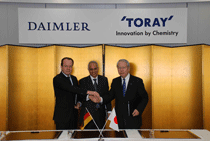Automotive plastics: Daimler, Toray strike deal for carbon fiber reinforced plastics
If imitation is the sincerest form of flattery, then officials at BMW and SGL Carbon must be blushing now. Last January the carmaker and the carbon fiber supplier announced their joint venture to manufacture carbon fiber-reinforced automotive parts. Today, almost exactly one year later, a similar announcement is being made by German automobile manufacturer Daimler AG and the world's largest manufacturer of carbon fibers, Toray Industries.
January 24, 2011
If imitation is the sincerest form of flattery, then officials at BMW and SGL Carbon must be blushing now. Last January the carmaker and the carbon fiber supplier announced their joint venture to manufacture carbon fiber-reinforced automotive parts. Today, almost exactly one year later, a similar announcement is being made by German automobile manufacturer Daimler AG and the world's largest manufacturer of carbon fibers, Toray Industries.
The German carmaker and the CF supplier have established a new joint venture for the manufacturing and marketing of carbon fiber based automotive parts. The intent, according to a Toray press release, is to mass produce high-tech lightweight components which can significantly improve the fuel economy and reduce the carbon dioxide emissions of cars.
Toray is headquartered in Tokyo, Japan; Daimler calls Stuttgart, Germany its home. The new JV will be headquartered in Esslingen, Germany, just outside Stuttgart, and will be established in the first quarter of this year. It has not yet been named. The partners are investing about €825,000 in the venture with Toray holding a 50.1% share, Daimler 44.9% and Advanced Composite Engineering (Immenstaad, Germany) holding a 5.0% share. This last company works on design and prototypes of carbon and other fiber-reinforced thermoset plastics, and so brings additional engineering experience to the venture, according to Daimler officials in answer to a PlasticsToday.com query.
|
(L to R) Celebrating the new venture for carbon fiber plastics parts' development are Rainer Christian Genes, VP, production planning Mercedes-Benz Cars, Bharat Balasubramanian, VP product innovations & process technologies at Daimler AG, and Shinichi Koizumi, executive VP at Toray. |
Under a Joint Development Agreement signed in March 2010, Toray, in addition to developing carbon fiber intermediate materials especially suitable for automotive parts, has been working on the design and processing of these materials, with Daimler taking responsibility for designing parts and developing technologies for joining of the parts. The companies now say that their JDA has succeeded in developing a technology for mass-production of carbon fiber reinforced plastics (CFRP) parts with what the companies describe as "a significantly shorter molding cycle." The partners plan to start supplying the mass-produced CFRP parts utilizing this "Short Cycle Resin Transfer Molding" for Daimler's Mercedes-Benz passenger vehicles to be launched in 2012. Daimler officials told us they would not specify what exactly those cycle time savings are.
In May 2010 we reported that the Reaction Process Machinery division of KraussMaffei, the world's largest manufacturer of plastics processing machinery, was teaming with one of the top names in compression molding machinery, Dieffenbacher, to develop improved systems for high-pressure resin transfer molding. The two said at the time of their announcement that their alliance would address the need for improved processing technologies as more carbon fiber reinforcement is used in the automotive industry.
Toray, already the world's largest supplier of carbon fibers, has identified expansion of its carbon fiber reinforced composite business in the automotive industry as one of its top priorities. In June 2008, the company established the Automotive Center (AMC), a development base for automotive applications, and in April 2009 opened its Advanced Composite Center (ACC), a center for developing technology and applications for CFRP products.
Daimler and Toray say they intend to continue promoting their joint development to establish an "overwhelmingly cost competitive" mass production technology. The moves by BMW and Daimler to establish formal ventures with CF suppliers seems to finally address a problem facing the automotive industry for years: how can it ensure that an adequate supply of these fibers will be available for its high-volume needs? Demand for the fibers has long whipsawed in tune with demand from the aerospace industry, making it difficult for CF suppliers to adequately plan investments or win financing for costly new carbon fiber plants. In recent years the wind energy market also has fought for its share of the fibers. With their agreements with suppliers, BMW and Daimler have formalized the means to ensure their supply lines are not dependent on lower demand from these other industries.
About the Author(s)
You May Also Like



